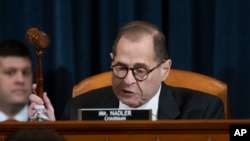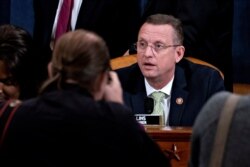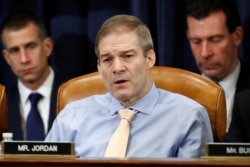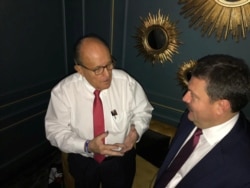The U.S. House Judiciary Committee approved two articles of impeachment against U.S. President Donald Trump Friday, clearing the way for a vote in the full House that could come as early as next week.
By a 23-17 vote along along party lines, committee members approved the articles, which accuse Trump of abuse of power and obstructing the congressional investigation.
The two formal charges now go to the full House, where they will be further debated before a final vote is held by the entire chamber, likely next Wednesday. Assuming the full House approves the two articles, Trump will have been impeached and will face a trial in the Senate early next year.
Moments after the vote, White House spokeswoman Stephanie Grisham issued a statement denouncing the vote.
"This desperate charade of an impeachment inquiry in the House Judiciary Committee has reached its shameful end," Grisham said. "The President looks forward to receiving in the Senate the fair treatment and due process which continues to be disgracefully denied to him by the House."
At a White House meeting later Friday with Paraguayan President Mario Abdo Benitez, Trump told reporters Democrats are "trivializing impeachment," but he added that "it seems to be very good for me politically." He declared Democrats' use of "the power of impeachment" is "an embarrassment to this country" and said he had no preference for a lengthy or abbreviated trial in the Senate. "I'll do long or short," he said.
Democratic lawmakers, after 14 hours of at-times rancorous partisan claims and counterclaims with Republicans on Thursday, rejected the Republican effort to eliminate the impeachment allegation that Trump abused the presidency by pushing Ukraine to investigate one of his chief 2020 Democratic election rivals, former Vice President Joe Biden.
The committee also approved a second article of impeachment, that Trump obstructed Congress by refusing to turn over hundreds of documents to impeachment investigators and blocked key Trump administration officials from testifying. The unified Democratic majority has the votes to block Republican efforts aimed at slowing the push to impeach Trump.
Congressman Doug Collins, the committee's top Republican, issued a statement accusing Democrats of playing dirty politics by delaying the votes after hours of debate Thursday.
"Today's vote highlights the pettiness of last night's delay and the folly of articles of impeachment that allege no crime and establish no case. While it's already clear that Democrats broke their own promises to rig this outcome, what will become more obvious in the coming days and years is that Democrats have gravely abused their power."
Flawed case?
Republicans contended that the case against Trump is flawed, that the committee was rushing to judgment without hearing more witnesses. They noted that Trump in September released the $391 million in military aid to Ukraine that Trump had temporarily blocked, without Ukrainian President Volodymyr Zelenskiy launching the politically tinged Biden investigation that the U.S. leader wanted.
Trump asked Zelenskiy in a late July phone call to "do us a favor" by opening the investigation of Biden, his son Hunter Biden's work for a Ukrainian natural gas company and a debunked theory that Ukraine worked to undermine Trump's 2016 election campaign.
Republican Congressman Jim Jordan, a staunch Trump ally, contended that the "us" in Trump's request was a reference to the United States, not to a Trump request to benefit himself politically.
But Democratic Congressman David Cicilline, supporting Trump's impeachment, said that Trump in his call with Zelenskiy "never once uttered the word corruption" to investigate corruption generally in Ukraine. "It was about a smear on Vice President Biden," Cicilline argued.
Full House vote
If the full House, as expected, votes to impeach Trump, he would become only the third American leader to be impeached in the country's 243-year history, setting the stage for a trial in the Republican-majority Senate in January, where his conviction and removal from office remains unlikely.
Trump denies wrongdoing and has ridiculed the impeachment effort. He has repeatedly referred to his discussions with Zelenskiy as "perfect," and pointed to statements by Zelenskiy and other Ukrainian officials that they did not feel pressured by Trump to open the investigations in order to get the military assistance it wanted to help fight pro-Russian separatists in eastern Ukraine.
House Judiciary Committee chairman Jerrold Nadler said that by withholding the military assistance, Trump "weakens an ally who advances American security interests by fighting an American adversary" and "weakens America. And when the president demands that a foreign government investigate his domestic political rivals, he corrupts our elections."
As the committee prepared for Friday morning's vote, reports surfaced that Trump's personal attorney, Rudolph Giuliani, was visiting the White House. The White House did not provide a reason for his visit.
Giuliani is a key figure in the impeachment proceedings, having led a shadow foreign policy campaign with Ukraine that helped trigger the investigation into Trump.
Giuliani returned last Saturday from Kyiv, where he had been working on a television series about the need for Ukraine to investigate the Bidens.
The timing of the approval of the articles of impeachment coincided with an announcement that an agreement had been reached between the U.S. and China on the first phase of a trade deal.
A senior Chinese official announced the deal almost precisely at the time the committee vote was underway, followed by an announcement from Trump shortly thereafter, capping a busy and historic week in Washington.014100p
Senate trial
The final step in the process would be a trial in the Senate, which Republican Majority Leader Mitch McConnell said Wednesday would occur next month.
McConnell met behind closed doors Thursday with White House Counsel Pat Cipollone and said later in an interview with Fox News he would be in "total coordination" with White House lawyers on whether to call witnesses.
McConnell reiterated he hoped the trial would be a "shorter process rather than a lengthy process" with multiple witnesses testifying, an approach preferred by Trump.
"You can certainly make the case for making it shorter rather than longer since it's such a weak case," McConnell said.
A conviction in the Senate would lead to Trump's removal from office, but that is highly unlikely because at least 20 Republicans would have to side with Democrats to meet the required threshold of 67 of the chamber's 100 members.
Two other U.S. presidents — Andrew Johnson in the mid-19th century and Bill Clinton two decades ago — were impeached, but both were acquitted in the Senate and remained in office.









